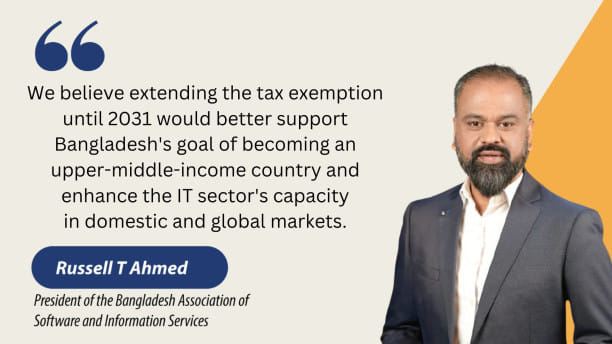ICT sector hails extension of tax exemption

On behalf of the ICT sector, I thank honorable Prime Minister Sheikh Hasina for extending the tax exemption on the ICT sector by three years, aligning with BASIS's proposal for a Smart Bangladesh. I also thank the NBR for recognising the ICT sector's crucial role.
However, we believe extending it until 2031 would better support Bangladesh's goal of becoming an upper-middle-income country and enhance the IT sector's capacity in domestic and global markets.
Impact of Tax Exemption on Other Sectors
This tax exemption will significantly boost the IT sector and play a pivotal role as this sector can be the nucleus for building a Smart Bangladesh across education, healthcare, agriculture, banking, and manufacturing sectors.
These sectors are integral to the Fourth Industrial Revolution. Without it, development would be disrupted, hindering the prime minister's vision of a Smart Bangladesh by 2041. This initiative revives BASIS's efforts toward self-sufficiency in software and IT services.
BASIS Advocacy for Extension in Pre-Budget Discussions
During the pre-budget discussion with the honorable Prime Minister at the Gonobhaban on May 25, I emphasised the importance of extending the tax exemption for the IT sector.
BASIS also met with key figures, including State Minister for Finance Waseqa Ayesha Khan and Chairman of the Parliamentary Standing Committee on Ministry of Posts, Telecommunications, and Information Technology Kazi Nabil Ahmed to address this matter.
Future Goal: Bangladesh's Self-Sufficiency in ICT
Our future goal should be self-sufficiency in information technology. This budget sets the path to achieving it. Prioritising the domestic IT sector in government procurement is essential, and foreign institutions should partner with domestic ones if capacity is lacking for participating in the government tender.
As Bangladesh is set to become a developing country in 2026, we will face challenges. Establishing a recognised system of intellectual property valuation will help convert these challenges into opportunities, attracting foreign investment and enabling entrepreneurs to secure loans and investments from domestic banks.
Extending the Coverage of the Tax Exemption
The ICT sector contributes 1.25 percent to the national GDP.
To reach the goal of having a US$50 billion digital economy by 2041, policies like tax exemptions are needed. Cloud services, system integration, medical transcription, SEO services, website hosting and IT outsourcing should be included.
With the Personal Data Protection Act (Draft) emphasising data localisation, keeping web hosting and cloud services tax-exempt will encourage local businesses.
The cloud services and web hosting market in Bangladesh is worth about US$20 million, with only 10 percent retained by domestic entrepreneurs. New taxes could force them out and deter new entrants.
Maintaining Duty-Free Benefits in Hi-Tech Parks
Investors in economic zones and hi-tech parks risk losing duty-free benefits and facing a 1 percent import duty on capital equipment. We urge the government to maintain current duty-free facilities and collaborate with the private sector to boost investment. This will significantly increase foreign investment in hi-tech parks over the next few years.
Reevaluating Tariffs on Mobile Phones
The current budget proposes duties on mobile phones based on price, which needs revision. Prioritising mobile phones, smartphones, and smart devices is crucial for Smart Bangladesh. Therefore, this tariff proposal should be withdrawn to ensure technology benefits reach everyone, including marginalised communities.
In conclusion, I reiterate that the information technology industry will build a Smart Bangladesh. By providing government policy support and keeping this sector tax-free, we can make Bangladesh self-sufficient in information technology by 2041.
The author is the president of the Bangladesh Association of Software and Information Services.



 For all latest news, follow The Daily Star's Google News channel.
For all latest news, follow The Daily Star's Google News channel.
Comments